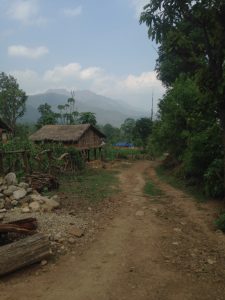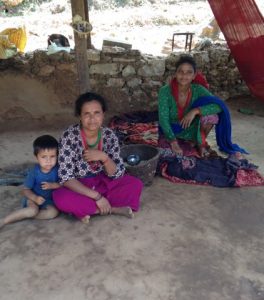In Nepali society, a woman moves in with her husband’s family when she gets married. She lives with her mother-in-law, her father-in-law and her husband’s paternal grandparents. Multiple generations living under one roof may seem complex and difficult for someone from a western country, but for Nepali people this is natural. Elders are to be cared for and respected.
Not only this, but Nepali society is also highly patriarchal. Men hold primary power and the predominant roles of political leadership, moral authority, social privilege and the control of power. But that doesn’t mean that women don’t have any power at all. In fact, it is the mother-in-law and the grandmother of a household who decide the rules, particularly in relation to issues such as cooking, cleaning, child – rearing and menstruation.
I had this realisation when we visited Umma, a local in Gutu, and her family. When we stumble upon their beautiful family home, Umma and her grandmother (only introduced as Amma, the Nepali word for grandmother) are preparing food. Umma is breaking up green bean stocks and Amma is cutting up a cucumber. They beckon us over cheerily, encouraging us to have a seat and to chat with them.
Umma and her Amma sit outside their home
Umma is 26 years old and, despite the tradition of arranged marriages in the community, she tells me that she is happily married. She has three children, and she explains to me that cooking is a passion of hers because she loves making sure that her family is well fed.
Encouraged by this enthusiastic welcome, I breach the subject of menstruation. The two women immediately come alive. Umma tells me that before she was married, she spent 4 incredibly uncomfortable and solitary days in a Chhau Goth every month. However, once she was married, she was no longer obligated to follow the tradition because no woman in her husband’s family practiced Chhaupadi.
 A view from Umma and her Amma‘s home
A view from Umma and her Amma‘s home
Curious about why a family wouldn’t practice a tradition as embedded in society as that of Chhaupadi, I wanted to know more. Amma jumped in eagerly with more information: “I am a Female Community Health Volunteer (FCHV) which means that I am against Chhaupadi and other harmful practices.”
The FCHV programme was originally implemented in 1991, with the purpose of improving the general health of the population. Because the majority of the population lived in rural areas, it was deemed important to have women on the ground working on health issues. These women are a focal point for bridging health – related programmes in the community. Amma explains to me that “We are a group of women who work on a range of women’s health issues, including menstruation and contraceptives. Our aim is to make sure that women are able to access contraceptives and understand how to maintain healthy reproductive systems.”
I am impressed by this programme and its obvious success. It targets health problems at their root, encouraging local community members to actively ameliorate their health-care programmes. Amma attests to this, telling me about the positive impact of the programme on her life and on the lives of those around her. She explains that FCHV training has allowed her to view women’s rights issues from a biological perspective, and that she now understands that menstrual blood is not impure. She loves to share this knowledge with other local women, encouraging them to give up the practice of Chhaupadi as well.
Speaking to Umma and her Amma, I realise that one of the fundamental factors that prevents women from refusing to stay in the Chhau Goth is a lack of understanding about the issue, and a fear that their family and friends will be hurt if they stay at home. It made me think about how important education and local programmes such as the FCHV can be in changing attitudes about health care. Women are more likely to give up the practice of Chhaupadi and to remain safely in their homes during menstruation if they are being told by a member of their community, and someone they view as similar to themselves.
I ask the women if they think Chhaupadi will be eliminated in the future, and both answer positively. This reassures me. It also strengthens my belief that Chhaupadi is an issue which needs to be targeted on multiple levels: grandmothers, mothers, fathers and daughters all need to be included in the discussion.
Posted By Boroka Godley (Nepal)
Posted Jul 26th, 2019



2 Comments
rachel wright
July 26, 2019
I love how we get many different viewpoints on the issue of chhaupadi through your blogs! From my research, I mainly run into projects/studies carried about by those of the international community, thus hearing about the successful actions of local community members is a great perspective!
Iain Guest
August 11, 2019
We tend to blame the older women in families for the fact that chhaupadi is so difficult to combat. Good to know that some of them are on the right side. I agree with Rachel – it’s wonderful to get these different portraits of village life. Is the FCHV training a government program or dne by NGOs? How extensive is it? Sounds interesting.